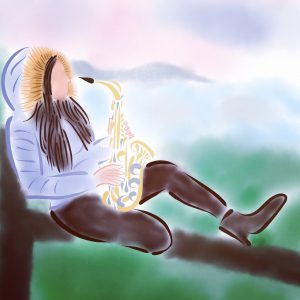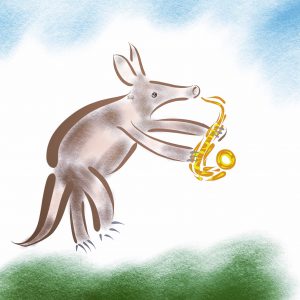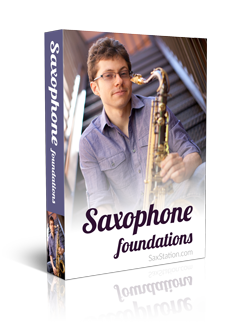Responding to a comment about saxophone prices.
Cantina Band on Soprano Sax, First Part
Composed by John Williams
Leave a comment if you want to learn this song or some other songs.
The first note on soprano/tenor is B. That makes it a concert A, so it’s an F# on alto.
Transposing for Saxophones, Video
A fairly expansive video about transposing, you can go to the downloads page to get a chart. And/or check out the related posts. Leave a comment if you still have questions.
Saxophone Riff #6 ABCDE Video
ABCDE on saxophone.
“…..whether to purchase an alto or soprano saxophone?” Video
I am new to playing saxophone, I play music at the church I go to and.
I want.to get familiar with playing sax. I like the sound of the saxophone from the songs, man eater from Hall and Oates and careless whisper from George Michael.
My question is, I don’t know whether to purchase an alto or soprano saxophone and what is the difference between both.
Thank you.
-Jorge
How to Play ‘Song of Songs’ Bass Line on Saxophone
Let me know if you want to play it on alto sax.
“Starting to play the sax and I wanna buy one but I don’t wanna spend more than $400”
Ruben
So I am barely starting to play the sax and I wanna buy one but I don’t wanna spend more than $400
Neal Battaglia
that severely limits your options
alto?
Ruben
Yes
Neal Battaglia
you might be able to find a used alto for that price
be careful though, unknown brands can break easily
what are you playing now?
Ruben
Well I am barely planning on starting to play
I’ve heard that buying a used saxophone is a bad idea
Neal Battaglia
what are you playing now?
that’s what I asked
Ruben
Well right now I play the bass guitar and I’m trying to get into playing the sax
Neal Battaglia
you said you were starting to play
are you playing it or not?
Ruben
No not yet
Neal Battaglia
say you’re about to play or want to play then
who told you a used sax is a bad idea?
and what did they recommend?
Ruben
A friend told me that saxophone are very delicate and that it’s better to buy them new and he recommended a selmer or Yamaha
Neal Battaglia
those are both good brands
they also cost more than 400 new
Ruben
Yea that’s why I wasn’t sure of what might be good but not as expensive
Neal Battaglia
Jupiter, Antigua
still more than 400 probably though
Ruben
Ohh and are those brands good
Neal Battaglia
they’re decent
I have a jupiter alto and I played some antiguas last month
How learning saxophone is like learning a language
Transcript:
All right, Neal Battaglia here, SaxStation.com. I want to talk a little bit about language. The tagline on Sax Station right now is speak Saxophone. You’ve probably heard some people talk about music’s a language. There’s a book about that by my friend Susanna. Victor Wooten talks about how learning a language is like learning music, there’s a lot of similarities. For me, in terms of language, when I was 15, I started to learn Spanish in school. And, I was actually a little bit lucky because my mom speaks a couple of other languages. She speaks Spanish very well, partly because she lived in Chili and South America for four years, so she helped me when I was learning Spanish in school.
Actually, kind of a funny story, is I took Spanish 1 and it didn’t seem too hard. I thought I could go ahead and skip to Spanish 3, so not doing Spanish 2, and I did that. But it turned out that that teacher for Spanish 3 was pretty challenging. He was much more challenging than any other language teacher at the school. So, I thought I’d be fine. It turned out I was in a little bit of trouble. He would have us do things like write essays that were a few pages or at least one or two pages in Spanish, give a presentation for a few minutes in Spanish. That was kind of a big jump from Spanish 1.
Challenging yourself when you’re learning anything, whether it’s saxophone, music, or a language or drawing or anything like that is often a really good way to progress and move forward and do the things you want to do with whatever skill you’re learning. So, getting challenged in this language in Spanish was really helpful for me. And, I learned a lot that year, I actually got so I could speak pretty good Spanish at that point, given I was only learning it for two years.
After that, I took another year, it was not nearly as challenging the next year so I learned a little bit, but not as much as I did that one year with the really tough teacher who was trying to help us out. After Spanish, I started to learn some German when I was in college, when I was going to Santa Clara. I had a minor, actually in the German language, so I took some classes, I studied a lot on my own. When I was working in the summer I would be listening to the language because I was preparing to go to Germany. I was going to study abroad there. I did that for two summers in Heidelberg and Freiburg two different cities kind of in the southwest part of Germany. I flew into Frankfurt one year and I flew into Stuttgart the other year, so kind of in that area of Germany.
Basically, I studied German quite a bit and I went to Germany and jumping in was a great way to learn the language. I made a lot of mistakes, but I wasn’t too hesitant about speaking and partially because I needed to do that in order to get food, figure out where I was going, do different things. After German, I actually didn’t really pick up any new language for a while, but about three years ago, I started learning Mandarin Chinese and that language is pretty different than anything I’d spoken before. With German, it’s pretty similar to English. With Spanish, it’s also similar to English in some ways. English kind of has a lot of German roots, it also has a lot of influence from Latin, so it’s going to be similar to both Spanish and German in different ways.
So, I learned two kind of similar languages, but then I jumped into something that was pretty different. I actually came up with a game to practice language. Once I kind of add a foundation, I started to play this game where I’d say something in English and I’d have the other person write down, someone who was learning English, then I would correct it. The idea of the game was actually this, it was so that they wouldn’t get it completely correct, but they also wouldn’t completely flounder and get every work wrong, because that’s kind of frustrating.
I kind of tell people that the goal is for the other person to maybe get 70, 80, 90% correct. If it’s mostly right, that’s cool, but then maybe you can challenge them a little bit more. If it’s mostly wrong, then you start adjusting, you make it easier. I would play this game too, someone would say something in Mandarin Chinese and I would write down. Sometimes I would get more than half right, sometimes I would get most of it right, but still I play this game to this day, because I still find it to be useful. Sometimes it’s just super hard, especially if I’m practicing with someone new. It might be that I’ll get 60% right or even less, maybe 40% and at that point I’ll say, well maybe speak a little slower. Or, maybe speak a little bit less. It’s hard to pick up what I’m hearing.
Basically, when you’re learning a language, you do want to be challenged, just like with music. If you always say what’s comfortable, you’ll get good at saying what is comfortable, but you won’t necessarily challenge yourself and you won’t necessarily progress like you want to. So, if you just play let’s say Blue Bossa all the time, you would have fun with it, it would be comfortable, you wouldn’t feel frustrated probably. But, you wouldn’t necessarily get better at saxophone and the way you want to get. That’s something actually Paul the trombonist was telling me and you can check out the interview we did. But he was saying that you always want to challenge yourself. You don’t want to make it so it’s fun, you do want to have fun too, but you want to challenge yourself so you get better at what you’re doing.
With language, I find it’s great to challenge yourself. I did it with Spanish for sure. I forced myself in the class and I got help too from my family. Then with Chinese, I came up with this game and it can be pretty challenging because I probably speak it at about a seven-year-old level, maybe a six-year-old, something like that more or less in the language. So, a lot of things can be pretty difficult, but the challenge is part of what helps you get better at a language, get better at the saxophone.
So, if you’re playing saxophone, one thing you can do, is you can play a song you know, switch to a song you don’t know, maybe come back to the song you know, maybe switch to another one. Come back. Kind of switch it up. Because you can also get things in your short-term memory. In your short-term memory, it feels like you know something, but then the next day you might not remember it. So, by kind of like spaced repetition, that’s one phrase to describe this, you can repeat things, but you don’t necessarily repeat it ten times in a row. That can be useful too. It’s good to be able to play something correctly three times in row. But to play something and to come back to it later, to make sure you know it, is going to get it into the long-term memory. Because the short-term memory is a little bit deceptive, it makes you feel like you know it, but you might not know it as well as it seems at that moment.
So, think about the challenge, think about what you can do to make your practicing on saxophone more of a challenge. And, also thinking about it as a language, if you’ve learned a language, can be a good comparison.
Tamara Kreimer Alto Sax (Drawing)

Tamara Kreimer
Why I Play a Vintage Saxophone
The horn I mostly play is a Buescher from 1920. Harder to play than some horns, pretty old, but I like the tone. They can cost less than new horns, can potentially need more repairs after you buy them also.
Aardvark Playing Saxophone! (drawing)



